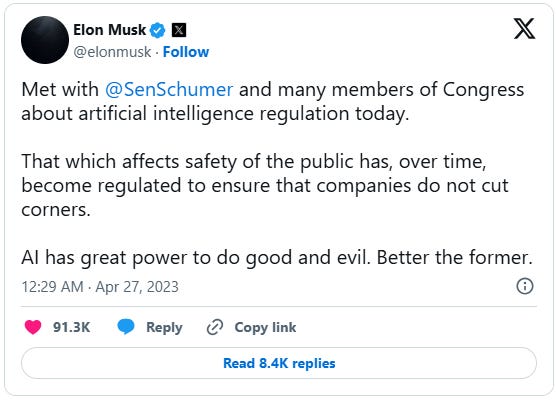|
Republicans want unregulated AI. What could go wrong?
A provision in Trump's big bill would eliminate state-level regulation for 10 years.
🦾 PN is possible thanks to paid subscribers. If you appreciate our fiercely independent coverage of American politics, please support us. 👇
The great artificial intelligence bait-and-switch is almost complete.
Here’s how it worked. First, industry leaders including Sam Altman, the head of OpenAI, went before Congress in 2023 and expressed their deep concern that the amazing tools they were developing might someday cause extraordinary harm, so there really ought to be some federal regulation of the industry. Senators were charmed and praised Altman for his openness.
Even Elon Musk advocated regulation — before his embrace of Donald Trump.
That regulation never came to pass, and perhaps the tech leaders knew it wouldn’t. Congress’s bias, after all, is always toward not doing something rather than doing something, particularly when the members don’t understand the technology at issue.
Fast forward to today, and with fears that China might best us in the battle for AI dominance, Congress has done a 180-degree turn — and so have the CEOs whose future wealth and power depends on AI. Now they’re saying: You can’t possibly regulate us, because if you do, it will destroy the glorious AI future we’re bringing you. And not only that, what if the Chicoms beat us to the punch!
Tucked into its gigantic budget bill among tax giveaways and cuts to Medicaid, the House passed a measure forbidding the states from regulating artificial intelligence for a period of 10 years.
“We have to be careful not to have 50 different states regulating AI, because it has national security implications, right?” said Speaker of the House Mike Johnson.
Many states have already passed laws regulating AI, most of which cover specific uses to which the technology is put. A California law, for instance, requires that certain kinds of AI-generated content contain detection tools that enable it to be identified as an AI creation. An Illinois law prohibits employers from using AI in ways that result in discrimination against job applicants. A Utah law requires companies to disclose to consumers that they are interacting with an AI system. All could be nullified if the Republican budget is passed, as could many of the hundreds of bills now being considered in state legislatures around the country.
Though both Republican and Democratic state officials have supported state laws to regulate AI, it is Republicans in Congress who are pushing the moratorium. The effort is being led by Ted Cruz of Texas, who in the last year or so has become a full-time podcaster with a side gig as a senator. Cruz confronted a problem after the bill passed the House: the Byrd Rule, which requires that only measures with a direct effect on the budget can be included in a reconciliation bill that can pass the Senate with 50 votes.
Cruz believes he solved that problem by changing the language so that rather than an outright ban on state regulation, the federal government would withhold money for broadband expansion — money every state wants — if they regulate AI.
“All of this busybody bureaucracy — whether Biden’s industrial policy on chip exports or industry and regulator-approved ‘guidance’ documents — is a wolf in sheep’s clothing,” says Cruz. “To lead in AI, the US cannot allow regulation, even the supposedly benign kind, to choke innovation or adoption.”



